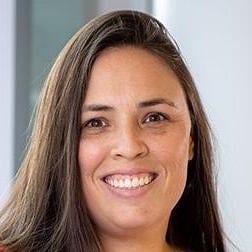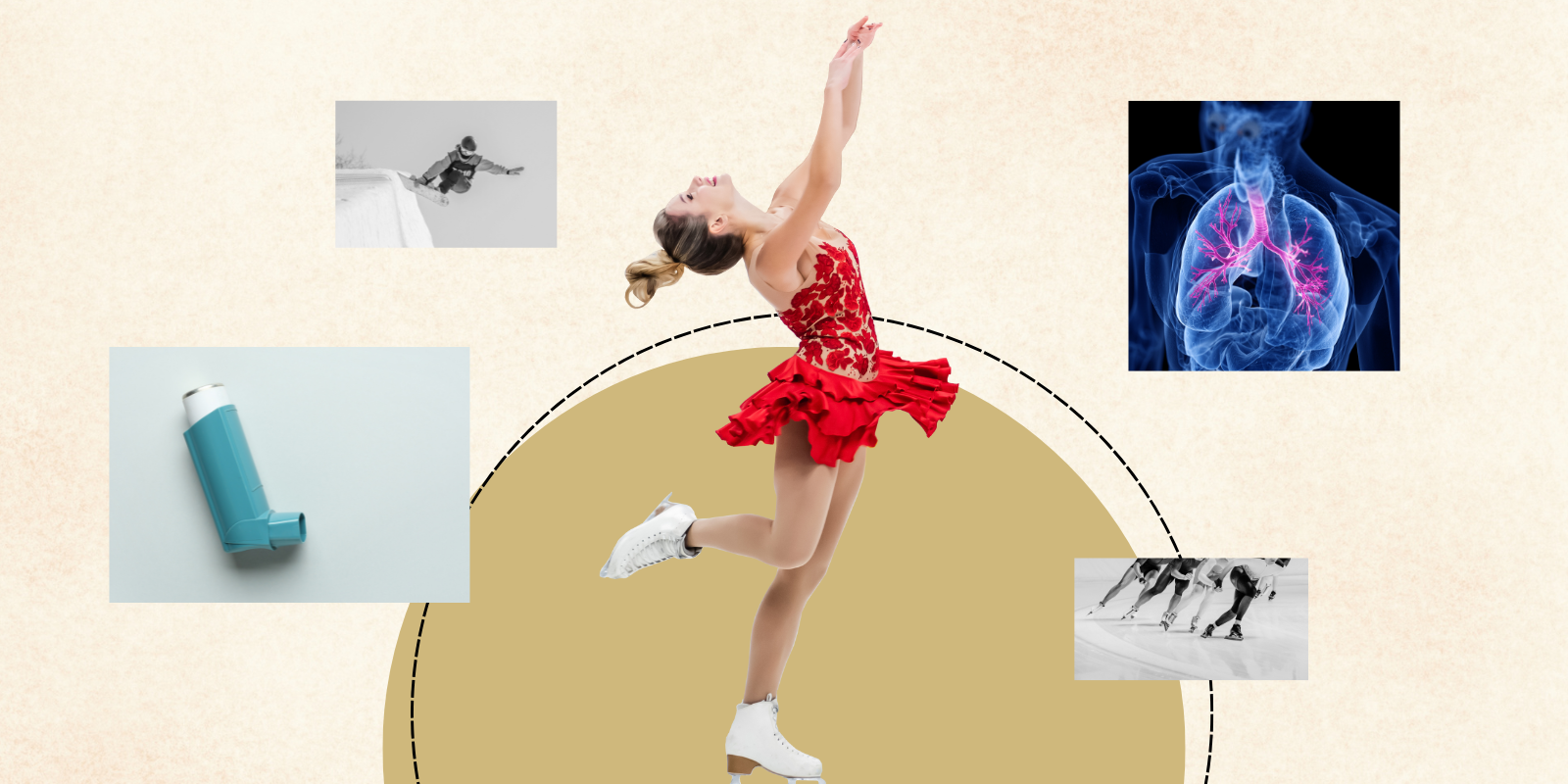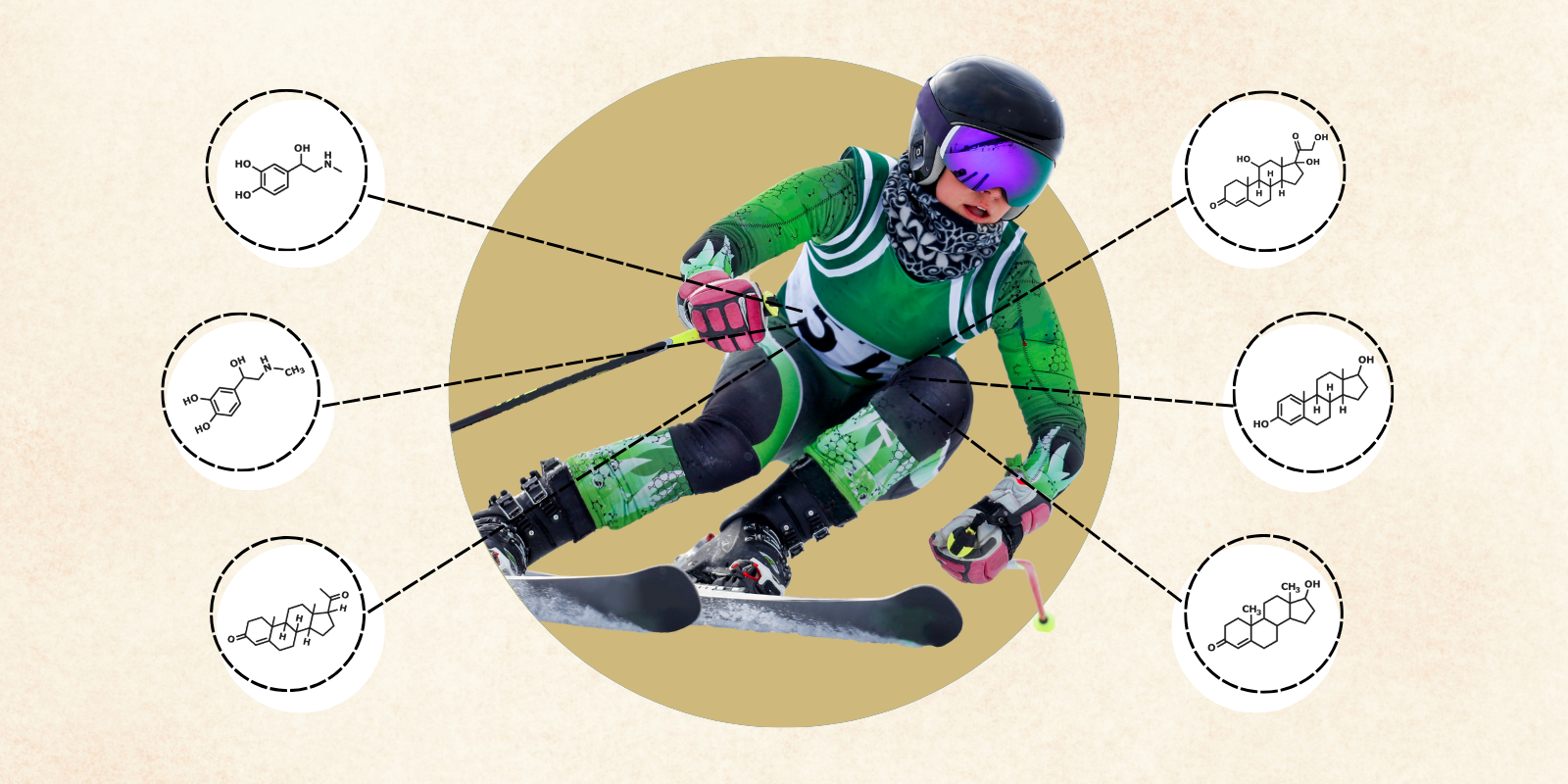Although the COVID-19 public health emergency has ended, a pressing health care crisis has emerged in its wake that many refer to as “long COVID” — a condition in which millions of Americans are experiencing negative symptoms weeks, sometimes even years, after a COVID infection.
Long COVID impacts people in a variety of ways, such as difficulty breathing, extreme fatigue, brain fog, or dizziness — symptoms that are sometimes debilitating. The National Institutes of Health describes long COVID as an “unsolved, complex, and urgent health care crisis.”
That’s why Sarah Jolley, MD, an associate professor in the Division of Pulmonary Sciences and Critical Care Medicine at the University of Colorado Department of Medicine, is working to deliver multidisciplinary care to patients while also contributing to pivotal national research on this elusive illness.
“There are so many patients who are suffering without clear answers and without clear therapies,” says Jolley, who is the medical director of the UCHealth Post-COVID Clinic, which is a multidisciplinary, integrated clinic that serves patients who have multi-system effects from long COVID.
The clinic is among three long COVID clinics in Colorado. Over the past four years, it has served roughly 2,000 people — a fraction of the number of patients who need care. State models estimate there are between 300,000 and 500,000 Coloradans who have long COVID, she says.
“That's what keeps us wanting to do the research and the clinical work, because otherwise, potentially 500,000 Coloradans will be struggling with no one,” Jolley says.
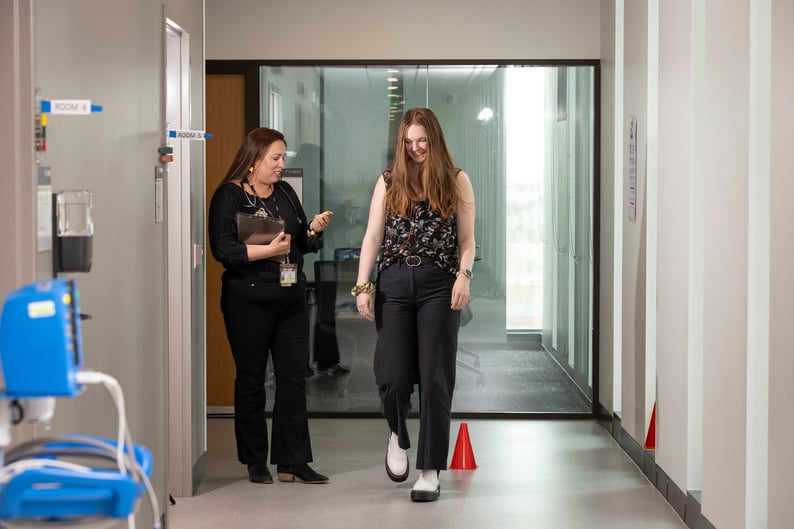 Sarah Jolley, MD, conducts an exercise to test a person's mobility, as it can be affected by long COVID. Photo by Justin LeVett for the CU Department of Medicine.
Sarah Jolley, MD, conducts an exercise to test a person's mobility, as it can be affected by long COVID. Photo by Justin LeVett for the CU Department of Medicine.
An evolving understanding of long COVID
There are a few different definitions of long COVID, and those definitions continue to evolve as further research is conducted, Jolley says.
Typically, it refers to when a patient has persistent multi-system symptoms, which can vary by each individual patient, for more than 12 weeks after initially getting a COVID infection.
“What we are increasingly learning is that it's not one singular syndrome,” Jolley says. “It's likely a collection of syndromes that lead to these multi-systemic problems that patients experience, and we're increasingly understanding that there are a number of biologic mechanisms that underlie those different clinical syndromes that we're seeing.”
Common symptoms of long COVID include cardio-respiratory symptoms such as prolonged shortness of breath and post-viral asthma, she says. Some patients have also experienced extreme fatigue to the point that they cannot work or even get out of bed.
Although some patients recover completely, others continue to face symptoms. A perplexing aspect of long COVID is that it impacts many patients who were previously healthy and fit, Jolley says.
“It can affect many people who didn't have much in the way of comorbidities before, and so it can be pretty life changing — to go from being active and then not being able to walk across your house,” she says.
Many of the current treatments are symptom-focused, based on the different symptom clusters a patient is experiencing.
“Everything we have right now is symptom-directed, nothing curative,” she says. “Seeing patients in the clinic motivates us to want to do the research so that we can offer them therapeutics, because their whole life has changed. Nobody fully understands why or can tell them exactly why.”
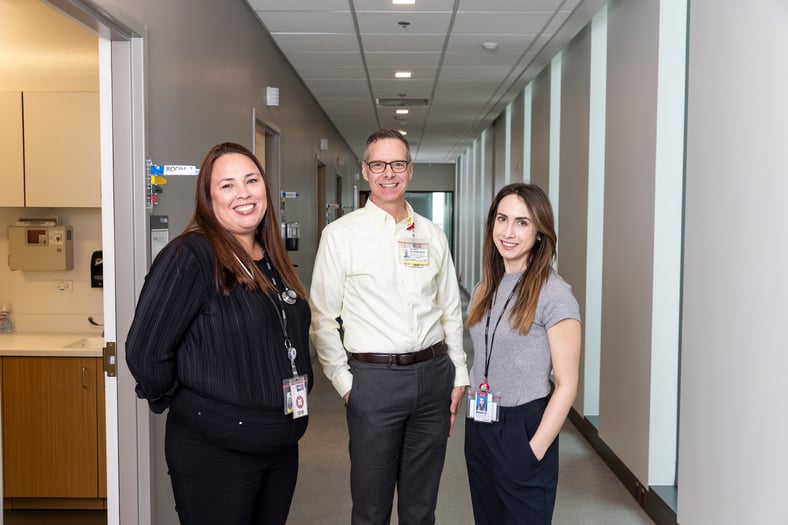 From left to right: Sarah Jolley, MD; Jeffrey McKeehan, MSN, RN; and Sarah Dowling, RN. Photo by Justin LeVett for the CU Department of Medicine.
From left to right: Sarah Jolley, MD; Jeffrey McKeehan, MSN, RN; and Sarah Dowling, RN. Photo by Justin LeVett for the CU Department of Medicine.
Forming the UCHealth Post-COVID Clinic
In the fall of 2019, when she began working at the CU Anschutz Medical Campus, Jolley aimed to help establish a multidisciplinary clinic that focused on ICU survivorship, where providers would see patients after the ICU. Then, the COVID-19 pandemic hit, and Jolley began getting messages about outpatients who were still struggling and experiencing long-term symptoms.
“That was at the beginning of us even realizing that long COVID was there — and that it was something that could impact patients across the spectrum of disease,” she says.
Many of the clinic’s early patients were health care providers who had been previously healthy. These providers began noticing they had horrible fatigue and could not concentrate.
Around May of 2020, the clinic began seeing outpatients and expanded its multidisciplinary team of providers, adding experts in cardiology, integrative medicine, physical therapy, and occupational therapy.
“We take a pretty broad approach to bringing patients in the clinic because we know that what each patient experiences can be different,” Jolley says. “Our clinic tries to tailor the patient visit to what individual patients are experiencing.”
The clinic has a dedicated nurse navigator who speaks with patients to understand their symptomatology and connect them with providers. That way, if a patient needs to see multiple providers, ideally, they can see all those providers in one day at the clinic.
“A lot of the multidisciplinary clinics across the country are multidisciplinary in that providers are talking to each other across disciplines, but they’re not integrated together in a singular clinic,” Jolley says. “That is what makes our clinic special and unique, and we wish we could do it for more patients.”
The clinic has faced steady demand since 2020, seeing an average of roughly 30 patients a week, she says.
“We certainly have seen that the need has persisted and that many people are still struggling. Despite the initial severity of the virus lessening, that risk for long COVID is very much still there,” Jolley says. “And still, many of our initial patients have not fully recovered and have ongoing needs.”
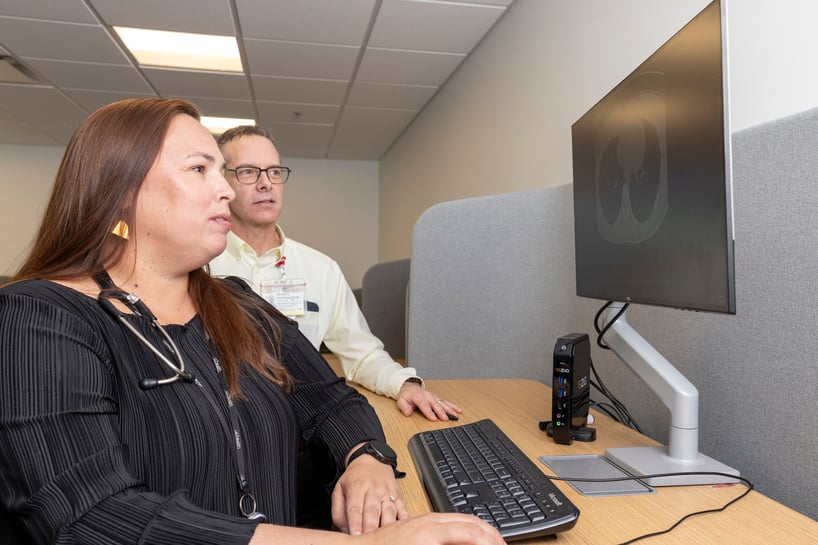 Sarah Jolley, MD, working alongside Jeffrey McKeehan, MSN, RN. In addition to serving as the medical director of the UCHealth Post-COVID Clinic, Jolley is involved in conducting critical research on long COVID. Photo by Justin LeVett for the CU Department of Medicine.
Sarah Jolley, MD, working alongside Jeffrey McKeehan, MSN, RN. In addition to serving as the medical director of the UCHealth Post-COVID Clinic, Jolley is involved in conducting critical research on long COVID. Photo by Justin LeVett for the CU Department of Medicine.
Joining a national research effort
In hopes of uncovering information about long COVID, Jolley has become involved in several research efforts through the NIH RECOVER initiative.
The RECOVER initiative, which launched in 2021 with $1.15 billion in congressional appropriations, is a nationwide research program to understand, diagnose, and treat long COVID. Nearly 90,000 adults and children are participating in RECOVER observational studies through more than 300 clinical research sites across the country, according to the NIH.
Jolley became involved with the RECOVER initiative early on, contributing to multiple studies. One paper, published in the Journal of the American Medical Association, for instance, was the first attempt to define long COVID, she says.
Currently, she is a co-investigator of a four-year RECOVER observational study with Kristine Erlandson, MD, an associate professor in the Division of Infectious Diseases who serves as the site principal investigator. The study has a cohort of patients — some who have had COVID, some with long COVID symptoms, some with no symptoms, and some who have never had COVID, Jolley says. There are nearly 400 patients in Colorado who are involved.
The study aims to establish a more definitive definition of long COVID, as well as determine risk factors for the development of long COVID and what may exacerbate or alleviate symptoms, she says.
“And then, there are blood samples and a number of tests that are done with all those patients that will look at some of these different biological mechanisms to help us understand exactly what's happening,” Jolley says.
In addition to the observational study, the RECOVER initiative also includes clinical trials, she says. Jolley is the site principal investigator for these trials.
“We’ve started to have what will be, eventually, five clinical trials that we'll be doing in that patient population,” she says. “The hope will be — as we shift out of this observational understanding phase — that we shift into therapeutics and clinical trials so that we can get people feeling better.”
Expanding knowledge and access
Beyond leading the clinic and contributing to vital research, Jolley is also improving awareness of long COVID and expanding access to care.
The UCHealth Post-COVID Clinic received grant funding through the Agency for Healthcare Quality and Research to become one of nine long COVID centers of excellence, Jolley says. She is a co-principal investigator on that grant program.
“The idea behind that grant is to bring these centers together to create best practices for care for patients with long COVID,” she says.
As part of that grant, the clinic is trying to get more Coloradans in rural areas and in underrepresented groups engaged in long COVID care.
“We're doing that piece in partnership with the Department of Family Medicine, via their statewide network of ambulatory practices,” she says. “With that, we also are trying to build out more e-consultation, telehealth usage to try to improve access for patients.”
Jolley is also collaborating with other multidisciplinary clinics in the state to create a long COVID community of practice — an initiative that was brought together and asked for by the lieutenant governor’s office, she says.
“Colorado, as a state, is trying to lead on long COVID,” Jolley says. “We just need more providers doing the work.”
Jolley says she hopes more providers will recognize the clinical importance of long COVID.
“Many of the patients they're seeing are experiencing it, and they may not even know it,” she says. “Our multidisciplinary team is always happy to assist and see patients that are struggling or having more complex illness — and to help providers think about how they, in their own clinics or their own spaces, can best treat these patients.”

